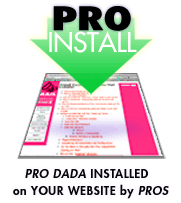DADA::App::FormatMessages
NAME
DADA::App::FormatMessages
SYNOPSIS
my $fm = DADA::App::FormatMessages->new(-List => $list);
# The subject of the message is...
$fm->Subject('This is the subject!');
# Use information you find in the headers
$fm->use_header_info(1);
# Use the email template.
$fm->use_email_templates(1);
my ($header_str, $body_str) = $fm->format_headers_and_body(-msg => $msg);
# (... later on...
use DADA::MAilingList::Settings;
use DADA::Mail::Send;
my $ls = DADA::MailingList::Settings->new({-list => $list});
my $mh = DADA::Mail::Send->new({-list => $list});
$mh->send(
$mh->return_headers($header_str),
Body => $body_str,
); DESCRIPTION
DADA::App::FormatMessages is used to get a email message ready for sending to your mailing list. Most of its magic is behind the scenes, and isn't something you have to worry about, but we'll go through some detail.
METHODS
new
my $fm = DADA::App::FormatMessages->new(-List => $list); format_headers_and_body
my ($header_str, $body_str) = $fm->format_headers_and_body(-msg => $msg);Given a string, $msg, returns two variables; $header_str, which will have all the headers and $body_str, that holds the body of your message.
ACCESSORS
Subject
Set the subject of a message
use_email_templates
If set to a true value, will apply your email templates to the HTML/PlainText parts of your message.
use_header_info
If set to a true value, will inspect the headers of a message (for example, the From: line) to work with
PRIVATE METHODS
_make_multipart_alternative
$entity = $self->_make_multipart_alternative($entity); Changes the single part, HTML entity into a multipart/alternative message, with an auto plaintext version.
_format_text
$entity = $self->_format_text($entity); Given an MIME::Entity (may be multipart) will attempt to:
Apply the List Template
Apply the Email Template
interpolate the message to change Dada Mail's template tags to their real value
_create_multipart
$entity = $self->_create_multipart($entity); Recursively goes through a multipart entity, changing any non-attachment singlepart HTML message into a multipart/alternative message with an auto-generated PlainText version.
_make_multipart
$entity = $self->_make_multipart($entity);
Takes a single part entity and changes it to a multipart/alternative message, with an autogenerated PlainText or HTML version.
_format_headers
$entity = $self->_format_headers($entity)Given an entity, will do some transformations on the headers. It will:
Tack on the list name/list shortname on the Subject header for discussion lists
Add the correct Reply-To header
Remove any Message-ID headers
Makes sure the To: header has a real name associated with it
_list_name_subject
my $subject = $self->_list_name_subject($list_name, $subject));Appends, $list_name onto subject.
_expand_macro_tags
$data = $self->_expand_macro_tags(-data => $data,
-type => (PlainText/HTML),
);
Given a string, changes Dada Mail's template tag into what they represent.
-type can be either PlainText or HTML
_macro_tags
my $s_link = $self->_macro_tags(-type => 'subscribe' );
my $us_link = $self->_macro_tags(-type => 'unsubscribe');Explode the various link pseudo tags into a form that will later be interpolated.
-type can be:
subscribe
unsubscribe
confirm_subscribe
confirm_unsubscribe
_apply_template
$content = $self->_apply_template(-data => $content, -type => $entity->head->mime_type, );
Given a string in -data, applies the correct email mailing list template, depending on what -type is passed, this will be either the PlainText or HTML version.
_apply_list_template
$new_data = $self->_apply_list_template($new_data);Given a string, will apply the List Template. The List Template is usually used for HTML screens that appear in your web browser.
get_entity
get_entity is a simple subroutine that takes a string, passed in, -data and turns it into a HTML::Entities entity:
my $entity = get_entity(
{
-data => $str,
}
); Optionally, you may also pass the -parser_params parameter, which will direct the parser on how specifically to parse the message. Currently, there is only one param to play around with: -input_mechanism - you can set this to either, parse (which is the default), or parse_open.
If you pass, parse_open, also pass a filename in -data instead of a string. Right.
my $entity = get_entity( { -data => $filename, } );
Make sure to delete the file when you're finished.
email_template
This subroutine is extremely similar to DADA::Template::Widgets screen subroutine and in fact is basically a wrapper around it, although it also "knows" about Email Message headers and attempts not to muck them up when you place variables in the template.
It basically looks at the various parts of your email message and passes these parts to DADA::Template::Widgets screen subroutine to be templated out.
The parts of the email message that will be templated out are any and all text/plain, text/html bodies - both of which have an inline content disposition (ie: it's not an attachment) and the To, From and Subject headers of a message.
For the To and From headers, this subroutine will only attempt to template out the phrase part of the header and will make sure that the phrase is properly escaped out.
One main difference between this subroutine and screen is that this subroutine does not take the template to work with in the -data, or, -screen parameter, but instead takes it in the, -entity parameter. The -entity parameter should be populated like so:
use MIME::Parser;
my $parser = new MIME::Parser;
my $entity = $parser->parse_data($msg);
DADA::App::FormatMessages::email_template({-entity => $entity});( Probably should elaborate...)
The subroutine also passes the -dada_pseudo_tag_filter (set to 1) automatically to screen.
COPYRIGHT
Copyright (c) 1999 - 2014 Justin Simoni All rights reserved.
This program is free software; you can redistribute it and/or modify it under the terms of the GNU General Public License as published by the Free Software Foundation; either version 2 of the License, or (at your option) any later version.
This program is distributed in the hope that it will be useful, but WITHOUT ANY WARRANTY; without even the implied warranty of MERCHANTABILITY or FITNESS FOR A PARTICULAR PURPOSE. See the GNU General Public License for more details.
You should have received a copy of the GNU General Public License along with this program; if not, write to the Free Software Foundation, Inc., 59 Temple Place - Suite 330, Boston, MA 02111-1307, USA.


